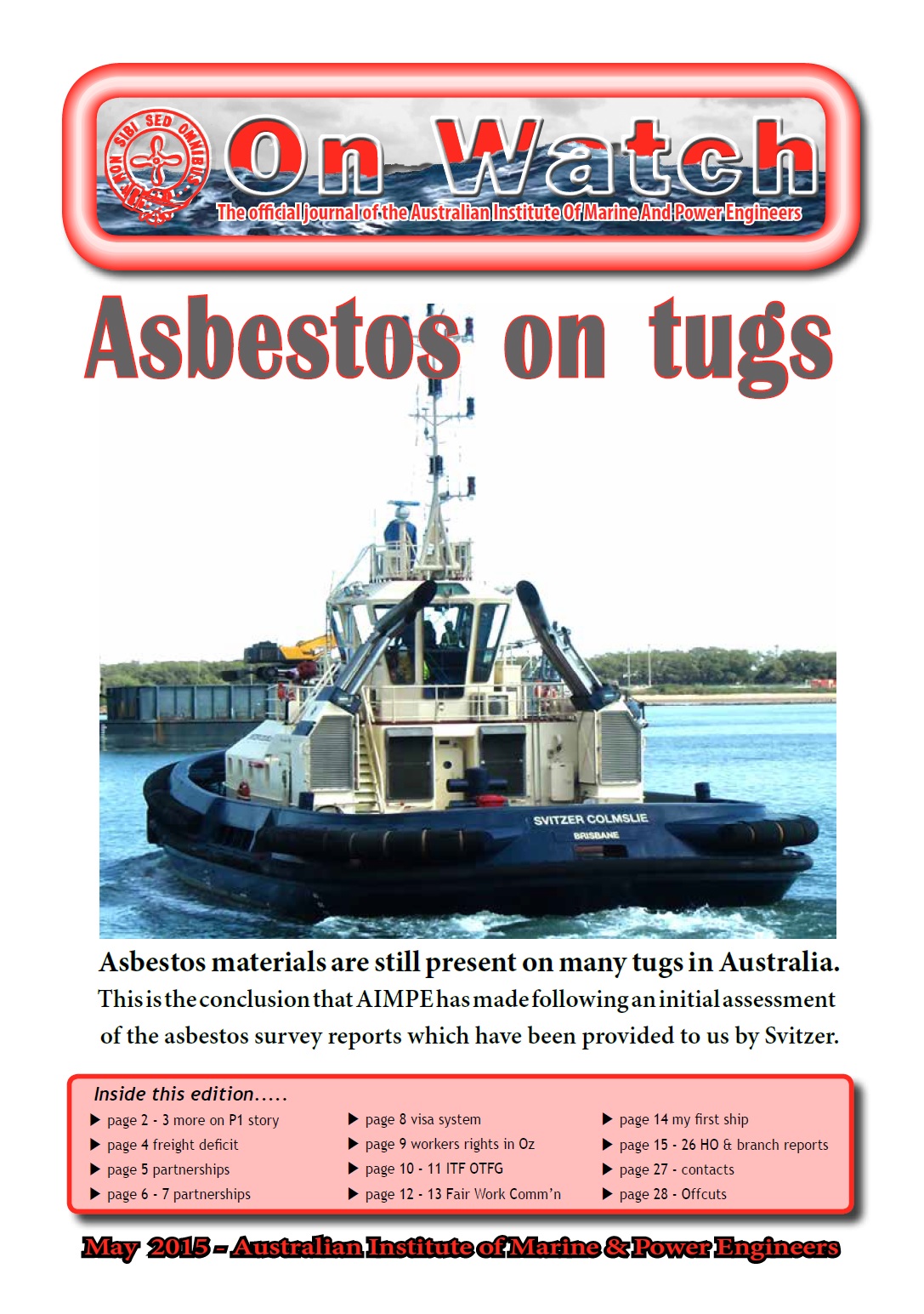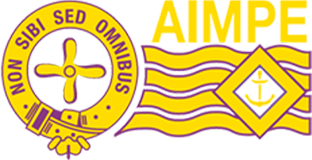Asbestos
(updated 12 03 24)
Trident Asbestos reports
(uploaded 12 03 24)
Members employed on the Trident LNG tankers may have had exposure to asbestos.
As steamships built in the 1980s and 1990s, the four ships did have asebstos containing materials.
Details of the materials can be found in these reports:
![]() NW Sanderling ACM Survey Report and register
NW Sanderling ACM Survey Report and register
![]() NW Sandpiper ACM Survey Report and register
NW Sandpiper ACM Survey Report and register
![]() NW Stormpetrel ACM Survey Report and register
NW Stormpetrel ACM Survey Report and register
![]() NW Snipe ACM Survey Report and register
NW Snipe ACM Survey Report and register
Asbestos is banned in Australia. Completely.
On ships there is one exception for old ships which were in existence and in operation in Australia before the ban (2003). That exception is for "in situ" materials. In situ materials are those which are sealed and done not pose any risk of exposure.
Importation into Australia of asbestos and any product that contains asbestos is prohibited:
![]() Customs_Prohibited_Imports__Regulations_F2011C00162.pdf (1.01 MB)
Customs_Prohibited_Imports__Regulations_F2011C00162.pdf (1.01 MB)
AIMPE members have been exposed to asbestos in the past when asbestos was widely used throughout
ships - in the engineroom and in the accommodation spaces.
AIMPE members have been exposed more recently too - for instance when replacing asbestos-containing
gaskets in pipework.
AIMPE has campaigned for decades to have all asbestos materials removed when its has been discovered.
One recent campaign was on tugs brought into the Port of Newcastle from China:

![]() ON_WATCH_MAY_2015__Asbestos_on_tugs__M_Byrne_article.pdf (337.33 KB)
ON_WATCH_MAY_2015__Asbestos_on_tugs__M_Byrne_article.pdf (337.33 KB)
AIMPE's submission to the Federal Government's Asbestos Management Review can be viewed here:![]() Asbestos Management Review submission (551.16 KB)
Asbestos Management Review submission (551.16 KB)
AIMPE endorses Asian asbestos ban campaign; read the letter here: ![]() Letter to Asian Governments re asbestos ban (412.00 KB)
Letter to Asian Governments re asbestos ban (412.00 KB)
National Asbestos Exposure Register
The Federal Government has established an asbestos register for all those who may have been exposed to asbestos at work.
https://www.asbestossafety.gov.au/national-asbestos-exposure-register
It is highly recommended that members who believe they have been exposed to asbestos register on the National Asbestos Exposure Register.
The National Asbestos Exposure Register is maintained by the Asbestos Safety and Eradication Agency -
https://www.asbestossafety.gov.au/
Test For Early Detection of Mesothelioma.
The mesothelioma research team at WA's Sir Charles Gairdner Hospital, has developed a blood test which will help to detect the onset of the deadly asbestos related lung cancer mesothelioma. The head of the team Professor Bruce Robinson said it would not only help in diagnosis of the disease but also in treatment. "Until now you could only gauge whether the treatment was working effectively by doing a CAT scan, and they're difficult to do. With this test, we can gauge treatment and also diagnose the disease at an earlier stage," Professor Robinson said.
Around 700 Australians are diagnosed with the disease every year and WA has the highest rate of mesothelioma in the world.
Seacare Guidance on Asbestos
Guidance on the prohibition of asbestos is here:
 Seacare guidance on prohibition of asbestos (118.87 KB)
Seacare guidance on prohibition of asbestos (118.87 KB)
Help for Asbestos sufferers
Anyone who has been diagnosed with asbestosis or mesothelioma can contact any of the following organisations around Australia:
Asbestosis and Mesothelioma Association of Australia here
Asbestos Diseases Foundation of Australia here
Asbestos Diseases Society of Australia here
Dust Diseases Board of NSW - https://www.ddb.nsw.gov.au/
Asbestos Related Diseases Support Society QLD here
Asbestoswise Victoria here
Asbestos Vicitms Association of South Australia here
Asbestos Free Tasmania Foundation here
Of course AIMPE members suffering from asbestosis or mesothelioma
should also contact their nearest Branch for legal assistance.
SCHEDULE 2: SUBSTANCES PROHIBITED FOR SPECIFIED USES
Amosite asbestos [Chemical Abstract Number 12172-73-5] (brown asbestos) - except for removal and disposal purposes and situations where amosite occurs naturally and is not used for any new application.
NOTE: This prohibition is identical to that applied to this substance under the NOHSC National Model Regulations for the Control of Scheduled Carcinogenic Substances [NOHSC:1011(1995)]
Chrysotile asbestos [Chemical Abstract Number 12001-29-5] (white asbestos) - all uses from 31 December 2003, including the replacement of chrysotile products when replacement is necessary, except:
- for bona fide research or analysis;
- when handled for storage awaiting disposal;
- for removal or disposal; or
- where encountered during non-asbestos mining.
The prohibition does not extend to the removal of chrysotile products in situ at the time prohibition takes effect.
List of exemptions can be found here...
Crocidolite asbestos [Chemical Abstract Number 12001-28-4] (blue asbestos) - except for removal and disposal purposes and situations where crocidolite occurs naturally and is not used for any new application.
NOTE: This prohibition is identical to that applied to this substance under the NOHSC National Model Regulations for the Control of Scheduled Carcinogenic Substances [NOHSC:1011(1995)]
Actinolite asbestos [Chemical Abstract Number 77536-66-4] — except for situations where actinolite occurs naturally and is not used for any new application.
Anthophyllite asbestos [Chemical Abstract Number 77536-67-5] — except for situations where anthophyllite occurs naturally and is not used for any new application.
Tremolite asbestos [Chemical Abstract Number 77536-68-6] — except for situations where tremolite occurs naturally and is not used for any new application.
A list of hazardous substances and usages subject to prohibition is to be developed by the National Commission. Pending the development of this list, jurisdictions are to insert existing prohibitions in this schedule.
